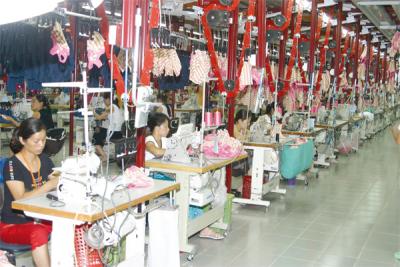The 5th Trade and Investment Framework Agreement (TIFA) Council meeting will be held over two days, Jan. 16-17 at the Inter Continental Hotel in Balaclava.The high level U.S. delegation will be led by Ambassador Demetrios Marantis, Deputy United States Trade Representative (USTR). Representatives of the U.S. Department of State, USTR Office and USAID East Africa Trade Hub will also attend. Secretary for Foreign Affairs A.P. Neewoor will lead discussions for Mauritius.
A pressing issue for Mauritius is renewal of the so-called Third Country Fabric Provision of AGOA, especially in light of the inability so far of the U.S. Congress to pass legislation approving an extension.
This provision allows least-developed countries in sub-Saharan Africa, including Mauritius, to receive duty-free access to the U.S. market for apparel that is made from fabric and yarn sourced anywhere in the world, rather than from within those countries or from the United States. The provision, which accounts for about 90 percent of apparel exported from Africa under AGOA, will expire Sept. 30.
The governments of Mauritius and other African countries have been pressing the Congress for the past two years to renew the provision before the end of 20ll because apparel orders are usually placed nine months in advance of delivery date. However Congress failed to act before adjourning in December, leaving the issue for the new legislative session which begins later this month.
Mauritius officials are concerned by recent decisions by U.S. buyers, worried that duty-free status of apparel from Africa may expire, to shift orders slated for delivery after Oct. 1 2012 from African producers to Asian manufacturers.
This could lead to collapse of sub-Saharan Africa’s textile and apparel industry, warned the Hon. Somduth Soborun, Mauritius ambassador to the United States. « Time is running out to avoid this collapse, » said the ambassador, who has held numerous meetings with congressmen to lobby for the fabric extension and participated in roundtable discussions with private organizations on AGOA issues.
« Both Republicans and Democrats agree on the substance for the extension of AGOA and the Third Country Fabric Provision, » Soborun said. « The question now is to avail of a trade vehicle to which the Third Country Fabric Provision can be attached.
« The lobbying efforts are continuing in Washington and are expected to further intensify in the weeks ahead, » he added.
The hope is to convince Congress to extend both the general AGOA law and the Third Country Fabric Provision to Sept. 30, 2015, said Paul Ryberg, a Washington attorney who heads the Mauritius-U.S. Business Association. « I am confident (3rd country fabric) will be renewed, » Ryberg told Weekend.
The TIFA, which is the subject of this week’s bilateral discussions in Balaclava, sets up a framework to address a variety of trade and investment issues between the United States and Mauritius. According to a work plan developed between the two countries, there are 14 areas of cooperation. In addition to AGOA, these include trade in fish and seafood, strengthening agri-business links and promoting intellectual property rights.
The two governments must meet at least once a year in either Port Louis or Washington to review progress on the work plan and set an agenda for the coming year. The United States has about 50 TIFA agreements, including a dozen with African countries other than Mauritius.
Trade between the United States and Mauritius was up 27 percent from 2009 to 2010, due primarily to an increase in Mauritian exports, according to the Mauritius Central Statistical Office. Leading exports include textile and apparel, precious stones, jewelry, live animals, prepared fish, medical/surgical instruments and leather products.
Mauritius now among world’s top countries for economic freedoms
For the first time ever, Mauritius has cracked the top ten in the annual rankings of countries that have embraced economic freedoms, according to a study released last week in Washington. The island took 8th place in the world rankings, ahead of more advanced economies such as Ireland (#9) and the United States (#10).
Mauritius also was ahead of all countries in sub-Saharan Africa, and the report notes that the region did more to expand economic freedoms in 2011 than did the countries of any other region of the world.
Launched 17 years ago, the 2012 Index of Economic Freedom evaluates countries in four broad areas of economic freedom : rule of law, regulatory efficiency, limited government and open markets. It is published annually by The Wall Street Journal and the Heritage Foundation, a Washington think-tank.
Mauritius became the first of the 48 countries in SSA to reach the top ten in the annual rankings. Its score of 77.0 – on a 1-100 scale with 100 being the best – marked an improvement of eight-tenths of a point over the previous year and is the highest ever acheived by a Sub-Saharan country. Second place went to Botswana.
« Underpinned by a sound and transparent legal framework that strongly upholds the rule of law, a competitive tax regime and an efficient regulatory environment have encouraged broad-based and diversified economic development in Mauritius,» Index editors wrote.
« Open-market policies that support dynamic trade and investment have bolstered productivity and competitiveness. With only a modest natural resource base, economic prosperity has been achieved through policies that encourage flexibility and empower individuals. »
Editors added: « the Mauritius government’s continued commitment to structural reforms and policies that promote integration into the global marketplace has positioned the island economy as a world leader in economic freedom. »
For more details: http://www.heritage.org/index/country/Mauritius
THE VIEW FROM WASHINGTON :U.S. officials arrive in Mauritius for trade talks
- Publicité -
EN CONTINU ↻



